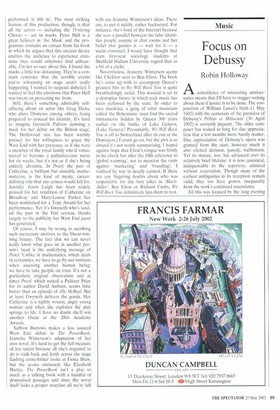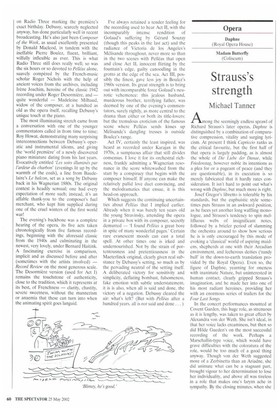Focus on Debussy
Robin Holloway
Acoincidence of interesting anniversaries means that I'll have to stagger writing about them if justice is to be done. The conjunction of William Lawes's birth (1 May 1602) with the centenary of the premiere of Debussy's Pelleas et Mdisande (30 April 1902) is certainly piquant. The older composer has waited so long for due appreciation that a few months more hardly matter. Due appreciation of Debussy's opera was granted from the start, however much it also elicited derision, parody, bafflement. Yet its stature, too, has advanced over its relatively brief lifetime: it is now canonical, indispensable to the repertory, admired without reservation. Though many of the earliest ambiguities in its reception remain valid, they too have grown, inseparably from the work's continued ascendancy.
All this was focused by the long evening on Radio Three marking the premiere's exact birthday. Debussy, scarcely neglected anyway, has done particularly well in recent broadcasting. He's also just been Composer of the Week, as usual excellently presented by Donald Macleod, in tandem with the ineffable Pierre Boulez, fluent, brilliant, wilfully inflexible as ever. This is what Radio Three still does really well; so was the six hours or so devoted to Pelleas alone, suavely compered by the French-music scholar Roger Nichols with the help of ancient voices from the archives, including Irene Joachim, heroine of the classic 1942 recording under Roger Desormiere, and — quite wonderful — Madeleine Milhaud, widow of the composer, at a hundred as old as the opera itself, recalling Debussy's unique touch at the piano.
The most illuminating stretch came from a conversation with one of the younger commentators called in from time to time; Roy Howat, demonstrating many surprising interconnections between Debussy's operatic and instrumental idioms, and giving the `world premiere' of a newly discovered piano miniature dating from his last years. Evocatively entitled 'Les soirs illumines par Pardeur du charbon' (evenings lit up by the warmth of the coals), a line from Baudelaire's Le balcon, set as a song by Debussy back in his Wagnerian 1880s. The original context is headily sensual; one had every expectation of more such; instead, it's an affable thank-you to the composer's fuel merchant, who kept him supplied during one of the cruel winters of the first world war!
The evening's backbone was a complete hearing of the opera, its five acts taken chronologically from five famous recordings, beginning with the aforesaid classic from the 1940s and culminating in the newest, very lovely, under Bernard Haitink. A fascinating exercise in comparison, implicit and as discussed before and after (sometimes with the artists involved) — Record Review on the most generous scale. The Desormiere version (used for Act I) remains the touchstone of authenticity, close to the tradition, which it represents at its best, of Frenchness — clarity, chastity, severe sweetness, without the mannerism or anaemia that these can turn into when the animating spirit goes languid.
I've always retained a tender feeling for the recording used to hear Act II, with the incomparably intense rendition of Golaud's suffering by Gerard Souzay (though this peaks in the last act) and the radiance of Victoria de los Angeles's Melisande throughout, never more so than in the two scenes with Pefleas that open and close Act II, innocent flirting by the fountain's edge, guilty canoodling in the grotto at the edge of the sea. Act III, possibly the finest, gave less joy in Boulez's 1960s version. Its great strength is to bring out with incomparable force Golaud's neurotic vehemence: this jealous husband, murderous brother, terrifying father, was deemed by one of the evening's commentators, surely rightly, as more central to the drama than either or both its title-lovers: but the tremulous eroticism of the famous scene where Pe!leas sends kisses up Melisande's dangling tresses is outside Boulez's range.
Act IV, certainly the least inspired, was heard as recorded under Karajan in the 1970s, a sumptuous affair that still divides consensus. I love it for its orchestral richness, frankly admitting a Wagnerian resonance in the score whitewashed from the start by a conspiracy that begins with the composer himself. If anyone can make the relatively pallid love duet convincing, and the melodramatics that ensue, it is this head-on approach.
Which suggests the continuing uncertainties about Pefleas that I implied earlier. Already when it was barely ten years old the young Stravinsky, attending the opera in a private box with its composer, secretly demurred — 'I found Pelleas a great bore in spite of many wonderful pages.' Certain rare evanescent moods can cast a total spell. At other times one is irked and undernourished. Not by the strain of portentousness and pretentiousness in the Maeterlinck original, clearly given real substance by Debussy's setting, so much as by the pervading neutral of the setting itself. A deliberated victory for sensitivity and simplicity, deflating bombast, fulsomeness, fake emotion with subtle understatement, it is is also, when all is said and done, the victory of a negation. Debussy cleared the air: what's left? (But with Pelleas after a hundred years, all is not said and done ... )























































































 Previous page
Previous page